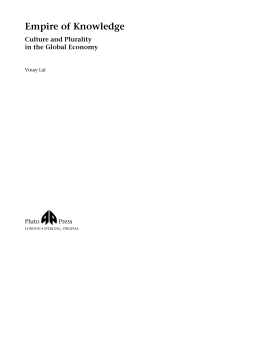
Additional Information
Book Details
Abstract
During the media frenzy over the Millennium celebrations, there was hardly any mention of the fact that, for the majority of the world, there was no Millennium at all. This linear understanding of time is a specifically Western - and Christian - concept.
This is just one of many examples that Vinay Lal uses to demonstrate that nearly every idea which we take for granted in the west is part of a politics of ideas. Oppression is usually associated with class struggle and other forms of economic monopoly. Lal looks beyond this, deconstructing the cultural assumptions that have emerged alongside capitalism to offer a devastating critique of the politics of knowledge at the heart of all powerbroking.
Other topics examined are the concept of 'development', which has provided a mandate for surreptitious colonisation; and the idea of the 'nation state', something we have lived with for no more than two centuries, yet is accepted without question. Linking this to the emergence of 'international governance' through the United Nations, the US, and imperial economic bodies (such as the IMF and WTO), Lal explains how such universalism came to dominate the trajectory of Western thought.
Table of Contents
| Section Title | Page | Action | Price |
|---|---|---|---|
| Contents | iv | ||
| Acknowledgments | ix | ||
| Introduction | 1 | ||
| 1 Reckoning with the Millennium | 16 | ||
| Monolithic Temporality | 18 | ||
| Democratizing/ Pluralizing Temporality | 31 | ||
| Keeping Watch on Time | 39 | ||
| 2 Politics in Our Times | 42 | ||
| Total Violence | 45 | ||
| Decolonization | 51 | ||
| Human Rights | 59 | ||
| 3 Governance in the Twenty-First Century | 69 | ||
| Democratic Totalitarianism: Requiem for the US | 73 | ||
| Nations, But Far from United: Neanderthal Politics | 82 | ||
| The Economic Imperium: The Era of the WTO | 96 | ||
| 4 Modern Knowledge and its Categories | 103 | ||
| The Violence of Development | 109 | ||
| The Forgetfulness of History | 116 | ||
| The Disciplinary Structure of Modern Knowledge | 122 | ||
| 5 Ecology, Economy, Equality | 131 | ||
| The Ecology of Equality: The Ecosystem of a Life | 138 | ||
| The Economics of Inequality: Poverty and Wealth | 144 | ||
| 6 Dissenting Futures | 152 | ||
| Finite Games: Hostage to The Clash of Civilizations | 158 | ||
| Infinite Games: Dissent in the Gandhian Mode | 171 | ||
| The Civilizational Ethos and the Future of Dissent | 175 | ||
| Postscript: 9-11, or The Terrorism That Has No Name | 183 | ||
| So What's In a Date? | 183 | ||
| Islamic Fundamentalism: So What's In a Name? | 185 | ||
| Fundamentalisms: Family Resemblances | 190 | ||
| A Tale of Countries: The United States ( Revisited) and Afghanistan ( Discovered) | 195 | ||
| Notes | 202 | ||
| Introduction | 202 | ||
| CHAPTER 1 | 202 | ||
| CHAPTER 2 | 206 | ||
| CHAPTER 3 | 212 | ||
| CHAPTER 4 | 218 | ||
| CHAPTER 5 | 223 | ||
| CHAPTER 6 | 228 | ||
| POSTSCRIPT | 233 | ||
| Suggestions for Further Reading | 237 | ||
| Index | 247 | ||
| academy | 10 |
